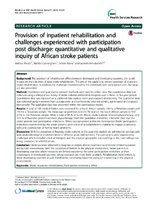| dc.contributor.author | Rhoda, Anthea | |
| dc.contributor.author | Cunningham, Natalie | |
| dc.contributor.author | Azaria, Simon | |
| dc.contributor.author | Urimubenshi, Gerard | |
| dc.date.accessioned | 2017-05-22T14:11:55Z | |
| dc.date.available | 2017-05-22T14:11:55Z | |
| dc.date.issued | 2015 | |
| dc.identifier.citation | Rhoda, A., et al. (2015). Provision of inpatient rehabilitation and challenges experienced with participation post discharge: quantitative and qualitative inquiry of African stroke patients. BMC health services research, 15(1): 423 | en_US |
| dc.identifier.issn | 1472-6963 | |
| dc.identifier.uri | http://hdl.handle.net/10566/2862 | |
| dc.identifier.uri | http://dx.doi.org/10.1186/s12913-015-1057-z | |
| dc.description.abstract | BACKGROUND: The provision of rehabilitation differs between developed and developing countries, this could
impact on the outcomes of post stroke rehabilitation. The aim of this paper is to present provision of in-patient
stroke rehabilitation. In addition the challenges experienced by the individuals with participation post discharge
are also presented.
METHODS: Qualitative and quantitative research methods were used to collect data. The quantitative data was
collected using a retrospective survey of stroke patients admitted to hospitals over a three- to five-year period.
Quantitative data was captured on a validated data capture sheet and analysed descriptively. The qualitative data
was collected using interviews from a purposively and conveniently selected sample, audio-taped and analysed
thematically. The qualitative data was presented within the participation model.
RESULTS: A total of 168 medical folders were reviewed for a South African sample, 139 for a Rwandan sample and
145 for a Tanzanian sample. The mean age ranged from 62.6 (13.78) years in the South African sample to 56.0
(17.4) in the Rwandan sample. While a total of 98 % of South African stroke patients received physiotherapy, only
39.4 % of Rwandan patients received physiotherapy. From the qualitative interviews, it became clear that the
stroke patients had participation restrictions. When conceptualised within the Participation Model participation
restrictions experienced by the stroke patients were a lack of accomplishment, inability to engage in previous
roles and a perception of having health problems.
DISCUSSION: With the exception of Rwanda, stroke patients in the countries studied are admitted to settings early
post stroke allowing for implementation of effective acute interventions. The participants were experiencing
challenges which included a lack of transport and the physical geographic surroundings in the rural settings not
being conducive to wheelchair use.
CONCLUSION: Stroke patients admitted to hospitals in certain African countries could receive limited in-patient
therapeutic interventions. With the exception of barriers in the physical environment, stroke patients in
developing countries where resources are limited experience the same participation restrictions as their
counterparts in developed countries where resources are more freely available. Rehabilitation interventions in
these developing countries should therefore be community-based focussing on intervening in the physical
environment. | en_US |
| dc.language.iso | en | en_US |
| dc.publisher | BioMed Central | en_US |
| dc.rights | © 2015 Rhoda et al. Open Access This article is distributed under the terms of the Creative Commons Attribution 4.0
International License (http://creativecommons.org/licenses/by/4.0/), which permits unrestricted use, distribution, and
reproduction in any medium, provided you give appropriate credit to the original author(s) and the source, provide a link to
the Creative Commons license, and indicate if changes were made. The Creative Commons Public Domain Dedication waiver
(http://creativecommons.org/publicdomain/zero/1.0/) applies to the data made available in this article, unless otherwise stated. | |
| dc.subject | Stroke | en_US |
| dc.subject | In-patient rehabilitation | en_US |
| dc.subject | Participation restrictions | en_US |
| dc.subject | Africa | en_US |
| dc.title | Provision of inpatient rehabilitation and challenges experienced with participation post discharge: quantitative and qualitative inquiry of African stroke patients | en_US |
| dc.type | Article | en_US |
| dc.privacy.showsubmitter | FALSE | |
| dc.status.ispeerreviewed | TRUE | |
| dc.description.accreditation | ISI | en_US |

